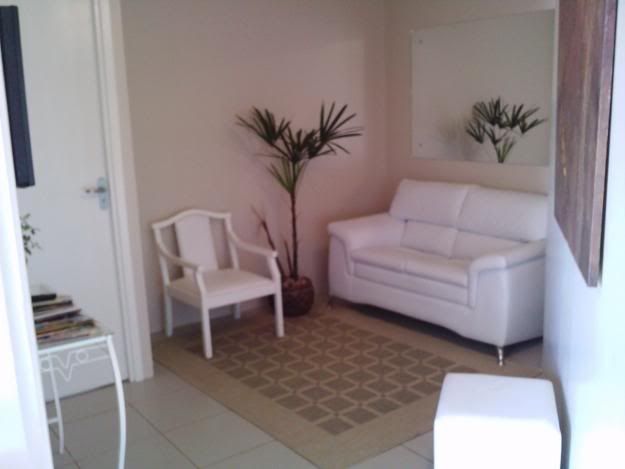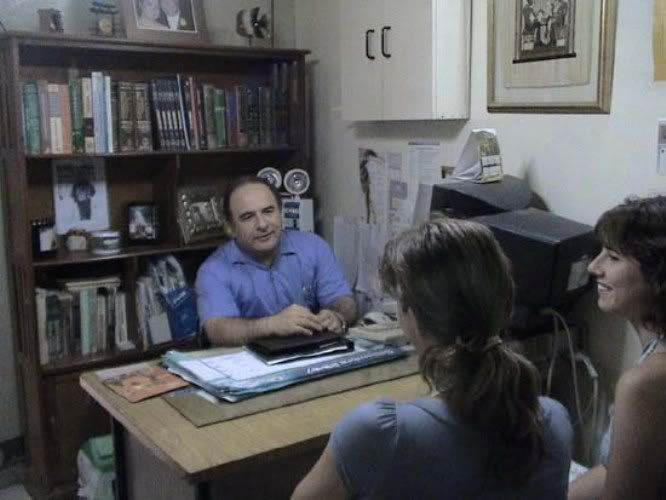My first experience at a doctor's office here in Brazil was quite strange. I felt really uncomfortable with the whole experience and was not really sure what to think. I had many illnesses as a child and when I developed Legg- Calvé- Perthes syndrome, I spent a whole lot of time in and out of the doctor's office. I think my experience with the medical world as a child, made it much more difficult to accept the differences in the way things are done here in Brazil.
I think a typical American experience at the Dr's office goes something like this... ( maybe my Brazilian friends might find this different) You make an appointment with the Dr. who is a general practitioner. You arrive at the clinic (generally a building specific for the doctor or a group of doctors) and announce your arrival at the reception desk. You wait in a large and usually spacious waiting room, fill out your forms (if there are any to fill out). There might be a small play area for the kids as well as chairs for the adults. You are then called back to the doctors area, where you enter one of several exam rooms. You wait in the exam room until the doctor sees you. Sometimes your wait in the exam room can take as long as the wait in the waiting room. The Dr, comes in (usually you are sitting on the bed or in a chair) he sits on his little chair in front of you. If there is a desk it is usually up against a wall and not usually used as a barrier between him and the patient. The Dr. spends most of his time next to you, asking questions and examining you. Then he either orders some tests or writes a prescription. If he orders tests, most of the time the x-ray's and blood work are taken in the same office on the same day. If it is an exam which allows you to have results in a few minutes, he will send you off to do that. You will then return to the room and wait for him to return with your result. You get the results and any prescriptions or medical preparations are given at the moment. If you need to see a specialist, you are given a referral at that time. You leave the room walking past all the other patients rooms where the doctor has now returned to attending. The doctor usually has several rooms with patients and he/she goes from one room to another attending several patients in the hour.
The Brazilian Dr. Office experiences that I have had. You need to make a general guess of what you think your problem might be. Look up a specialist in that area (whom your insurance works with), make an appointment. If they are a good doctor, you can expect a few weeks to months of wait. If you have no clue what your problem is, you go to a general practitioner for them to guess it for you.
 |
| Doctors Office. |
 |
| Waiting Room. |
 |
| The Doctors Consultation. |
You take your prescriptions and requests for blood work or x-rays to the third source (usually a specialized clinic in diagnostics). You then wait for several days for the results. You pick up the results and take them to your next scheduled appointment with your doctor.
One interesting thing that never happened to me in the USA is that I am the one who keeps all my x-rays and all my exam results. The doctor only looks at them, makes notes and then returns them to me before I leave the office. I have a little stack of all my exams an x-rays here in my closet. No need to ask the doctor for a medical history report.
So, the things that were very difficult for me. The office being a home can seem very informal and can cause you to make a judgment about the doctor based on the condition of the home. I have only one Dr. who I see in an actual clinic that was built for that purpose, the rest are all in converted homes. I mean, seriously... the only doctors I knew who did work from a house were the doctors who lost their license and were hiding the practice. Another issue is the doctor sitting behind a desk and not very interactive with the patient during the consultation. This can seem a little intimidating and a bit formal. I also don't like having to get my exams done by a 3rd source and not being able to walk down the hall to get my x-ray done.
Things I like. I like that the doctor has devoted attention to me, he isn't running off to attend another patient down the hall, and I don't wait for him, he waits for me. I like that I don't need a referral, I can go straight to the specialist (if you know what your problem is this can cut down several weeks of waiting to solve the issue). I like that I get to keep my exam results and I like that I can take a look at them any old time I want. It comes in handy when I try to explain to people that I have less than half my hip left. Somehow an x-ray is worth a thousand words in that case.
So, tell me what you think? Would these things bug you? Would you be able to take a doctor seriously if you were being attended in a converted bedroom, bathroom, kitchen?

1 comment:
Answering as an American -
I''m older so I remember going to converted homes to the Dr or Dentist. The doctor I went to when pregnant with 3 of my children practiced out of a converted home, so THAT doesn't bother me. When I was growing up, 50 years ago, we ALWAYS had to go someplace else for our tests. It was inconvenient - but there are some tests we have to go to a seperate lab for. Mamograms, MRI's etc. Blood work is in-office. But E-Rays are usually just in the orthopedic offices or in Urgent care places. Your clinic in Belen was unusual because it was a Dr's clinic plus an urgent care clinic. That's why they had all that equipment.
The thing that DOES bother me is that the Dr there doesn't examine you. Any nurse can tell you that the feel of the skin, the look of the tongue, skin, eyes, ears, feeling the glands can indicate many things that may not come up when a person just says how they are feeling.
One bit of clarification: whether or not you need to go to a GP for a referral depends on your insurance plan. Ours changed often over the years, depending on what plan our company switched to that year. Sometimes we had to have referrals and sometimes we didn't . We haven't had to have referrals for quite a few years. When something crops up on Dad's skin he just calls his dermatologist. If we are having to have tests or procedures done we have to have a perscription for the lab from our doctor, unless, of course, if we are paying out of our own pocket, then we don't.
Post a Comment